Normal
0
false
false
false
EN-US
X-NONE
X-NONE
/* Style Definitions */
table.MsoNormalTable
{mso-style-name:”Table Normal”;
mso-tstyle-rowband-size:0;
mso-tstyle-colband-size:0;
mso-style-noshow:yes;
mso-style-priority:99;
mso-style-parent:”";
mso-padding-alt:0in 5.4pt 0in 5.4pt;
mso-para-margin-top:0in;
mso-para-margin-right:0in;
mso-para-margin-bottom:10.0pt;
mso-para-margin-left:0in;
line-height:115%;
mso-pagination:widow-orphan;
font-size:11.0pt;
font-family:”Calibri”,”sans-serif”;
mso-ascii-font-family:Calibri;
mso-ascii-theme-font:minor-latin;
mso-hansi-font-family:Calibri;
mso-hansi-theme-font:minor-latin;}
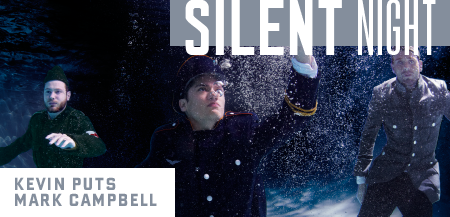
Kevin Puts & Mark Campbell’s Silent Night
Ho, Ho, Ho, and a Bottle of Cheer and Fun!
Season’s Greetings! As the song goes, “It’s the most wonderful time of the year.” And what better way to celebrate the Christmas and New Year’s holiday season than with music and song. Last Christmas, to borrow a line from pop singer George Michael, I gave you some song-filled chestnuts to roast on your terribly expensive MP3 player (see the following link: http://josmarlopes.wordpress.com/2012/12/23/chestnuts-roasting-on-your-mp3-player-the-best-loved-christmas-songs-and-carols-collection/). This year, “to save me from tears,” our unwrapped gift to readers will be a list of the top Christmas-themed and/or New Year’s Eve-related operas.
This list, out of necessity, must include a few out-of-the-way works, since for many years religious displays or Biblical representations were oftentimes banned from the operatic stage. But in the end you will agree: It’s the thought that matters.
And now, on with the show:
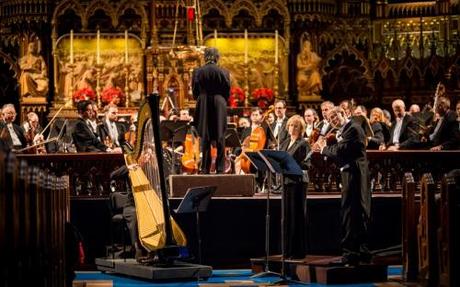
L’Enfance du Christ (www.osm.ca)
1. L’Enfance du Christ (“The Infancy of Christ”) – Hector Berlioz (music and text). First performed in Paris, on December 10, 1854. Though not strictly an opera, this is the earliest composed item on our program, one that perfectly summarizes the spirit of the season. Berlioz was one of those exceedingly driven individuals whose musical ambitions and “penchant for the monumental,” shall we say, habitually outweighed his capacity to control them. Nevertheless, this wonderfully unpretentious piece (Berlioz refused to label it an oratorio or even a cantata), which is divided into three parts, or episodes — much like the panels of a Renaissance triptych — is one of the French composer’s least bombastic, yet most beguiling works. Not known as a religious man per se, Berlioz loosely derived his respectful text from the New Testament story of Jesus’ birth, Herod’s slaughter of the innocents, and the Holy Family’s flight into Egypt. He employs a tenor narrator to set the mood, but the real winner is in his choice of orchestral colorations: a sense of comfort and joy, as well as peace and serenity, are maintained throughout by his arrangement of harps and woodwinds, with the muted choir mystically intoning the serenely moving “Amen” at the conclusion, a lovely touch indeed. This is a marvelously low-key way to begin our holiday outing. Of course, I could have also included Handel’s omnipresent Messiah, but that would mean inserting Bach’s Christmas Oratorio and other sacred works into the fray, which tend to make this list unwieldy. The difference here is that L’Enfance du Christ can withstand a stage treatment, whereas the other works mentioned would suffer by it. Trust me on this!
Recommended Recording or DVD/Blu-ray disc:
· Yann Beuron (Narrator), Karen Cargill (Mary), William Dazeley (Joseph), Matthew Rose (Herod) – London Symphony Orchestra, Tenebrae Choir, Colin Davis (conductor). LSO Live 2-CDs
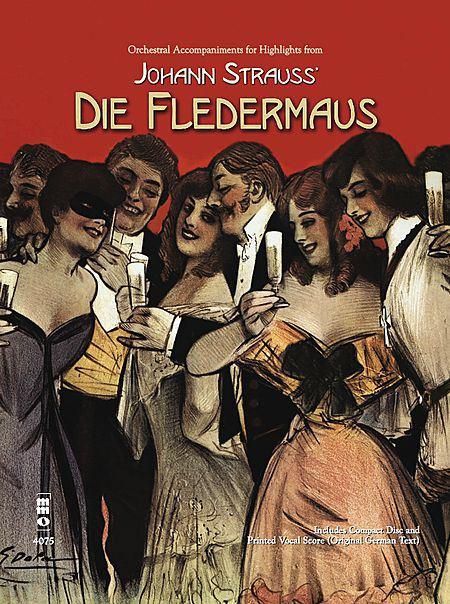
Die Fledermaus (sheetmusicplus.com)
2. Die Fledermaus (or “The Bat”) – Johann Strauss Jr. (music), first performed on April 5, 1874, at the Theater an der Wien, in Vienna, Austria. Original libretto by Carl Haffner and Richard Genée based on a French vaudeville, Le Réveillon (“New Year’s Eve”) by Henri Meilhac and Ludovic Halévy. An exceedingly spritely showpiece, the operetta known as Die Fledermaus has been presented almost annually in Vienna since its first appearance there. Strauss the Younger (as well as dear old dad, Johann Sr.) was dubbed the city’s “Waltz King,” which inevitably led to Old Vienna earning the title of “Waltz Capital” of Europe. The complicated story line involves a certain Dr. Falke seeking revenge on his old pal and drinking buddy, Gabriel von Eisenstein, for a prank he played on him the previous year. Couples are cuckolded, identities are mistaken, brotherhood is saluted, men find themselves in jail, and the whole cast comes together in praise of wine, women and song in the unparalleled comradeship of Act II, which climaxes in a New Year’s Eve celebration to end all celebrations. At this point, most productions insist on presenting their panoply of star performers in favorite party encores, a scintillating hodgepodge of musical hors d’oeuvres and delightful bonbons as depicted in the now famous Decca/London “Gala Sequence” recording from 1960 (highly recommended). There are enough madcap comings and goings in Die Fledermaus to fill three banquets, let alone one. A lavish new Met production, in English, is due to arrive on… you guessed it: New Year’s Eve 2013. Stay tuned for that one! If you want a sampler of Strauss’ melodious and sparkling score, give a listen to the overture. The champagne has never flowed more smoothly. “Trinke, Liebschen, trinke schnell!”
Recommended Recording or DVD/Blu-ray disc:
· Hilde Gueden (Rosalinde), Regina Resnik (Orlofsky), Erika Köth (Adele), Waldemar Kmentt (Eisenstein), Eberhard Wächter (Falke), Giuseppe Zampieri (Alfred), Walter Berry (Frank) – Vienna Philharmonic, Herbert von Karajan (conductor). Decca/London 2-CDs
· Pamela Coburn (Rosalinde), Brigitte Fassbänder (Orlofsky), Janet Perry (Adele), Eberhard Wächter (Eisenstein), Wolfgang Brendel (Falke), Josef Kopferweiser (Alfred), Benno Kusche (Frank) – Bavarian State Opera, Carlos Kleiber (conductor), Otto Schenk (director). Deutsche Grammophon 1-DVD
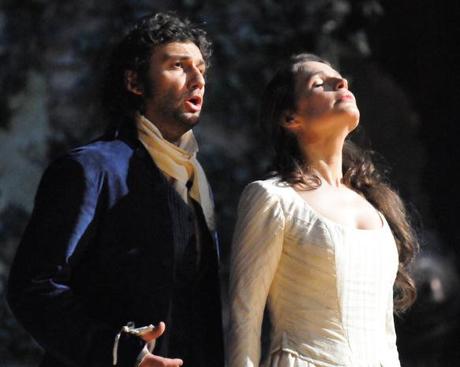
Werther (Jonas Kaufmann) & Charlotte (Sophie Koch) http://www.imz.at
3. Werther – Jules Massenet (music). Although completed in 1887, Werther did not receive a complete performance until February 16, 1892, in a German translation no less, not the expected French, at a theater in Vienna. With text by Édouard Blau, Paul Milliet, and Georges Hartmann, from Johann Wolfgang von Goethe’s semi-autobiographical novel, The Sorrows of Young Werther, the book was a sensation in its day, mostly due to the forlorn and lovesick nature of its title character. That’s all fine and well, but where’s the connection to Christmas? Ah, that comes both at the beginning and ending of Massenet’s lush romantic work. In the first scene, which opens in the heat of a midsummer’s day, an old widower, the Bailiff, who is also father to Charlotte, is teaching his younger children a Christmas carol. A poet named Werther happens along. He is madly in love with Charlotte (Lotte in the novel), but is unable to express his passion for her due to her forthcoming marriage to Albert, a much older gentleman. In the opera’s third act, which takes place at Christmastime, Werther has written Charlotte a farewell note, along with a separate request to her husband for his hunting pistols. Sensing trouble afoot, Charlotte rushes to Werther’s side in the dead of winter (depicted in an atmospheric orchestral interlude), only to find him near death, the result of a fatal gunshot wound. Overcome by the situation, Charlotte confesses her deep and abiding love for the poet as Werther expires peacefully in her arms. Whew! Outside, the children are singing the same Christmas carol we heard in the opening scene. Talk about Lifetime Movies, this one’s a three-handkerchief special. There’s a new production planned by the Met Opera for 2014, to star the smoldering tenor Jonas Kaufmann. I wouldn’t miss it, but in the meantime a healthy and hearty “Noël, Noël, Noël” to one and all.
Recommended Recording or DVD/Blu-ray disc:
· Roberto Alagna (Werther), Angela Georghiu (Charlotte), Patricia Petibon (Sophie), Thomas Hampson (Albert) – London Symphony Orchestra, Antonio Pappano (conductor). Warner Classics 2-CDs
· Jonas Kaufmann (Werther), Sophie Koch (Charlotte), Anne-Catherine Gillet (Sophie), Ludovic Tézier (Albert) – Opéra National de Paris, Michel Plasson (conductor), Benoit Jacquot (director). Decca (Universal Music Group) 1-DVD
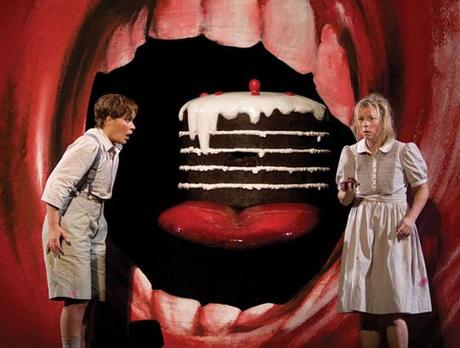
Hansel (Alice Coote) & Christine Schafer (Gretel) Met Opera
4. Hänsel und Gretel – Engelbert Humperdinck (music), libretto by the composer’s sister, Adelheid Wette, who based this “fairy tale opera” on the Brothers Grimm story. The first performance was given on December 23, 1893, in Weimar, Germany. Here’s another example of a work not necessarily related to the Christmas season. In fact, the opera’s association with the Judeo-Christian holiday comes from its having been the first complete radio broadcast of a lyric work by the Metropolitan Opera Company, on December 25, 1931. Other than that, it’s pure child’s play, as it were, with the outlines of the plot faithfully, if rather operatically, rendered. All the principal characters are here: Hansel, Gretel, the Wicked Witch, the Father, the Mother, the Dew Fairy, the Sand Man, even the Gingerbread House, with the auxiliary bonus of a Wagnerian-sized orchestral force to command the ear and a children’s chamber choir to add to the luxuriance of the sound. In the past, most productions adhered to a mezzo-soprano Witch (with the appropriate broomstick and pointy nose and hat, quite naturally), but most modern interpretations employ the services of a character tenor in the part — to good effect, it must be mentioned. The current Met version updates and modifies the story to create some incredibly imaginative stage pictures, if at times in opposition to the text, thanks to director Richard Jones. Not to fear: the superlative new English translation (by librettist David Pountney) lends an air of darkness to this much beloved piece. This opera holds a special place in my heart: it was the first one I ever saw performed live and onstage. Now, children, don’t forget: “With your foot go tap-tap-tap / with your hands go clap, clap, clap…”
Recommended Recording or DVD/Blu-ray disc:
· Barbara Bonney (Gretel), Anne-Sophie von Otter (Hänsel), Marjana Lipovšek (Witch), Andreas Schmidt (Father), Hanna Schwarz (Mother) – Bavarian Radio Orchestra, Jeffrey Tate (conductor). EMI 2-CDs
· Christine Schäfer (Gretel), Alice Coote (Hänsel), Philip Langridge (Witch), Alan Held (Father), Rosalind Plowright (Mother) – Metropolitan Opera Orchestra & Chorus, Victor Jurowski (conductor), Richard Jones (director). EMI Classics 1-DVD
5. La Bohème – Giacomo Puccini (music), with Luigi Illica and Giuseppe Giacosa (libretto). First performed at the Teatro Regio, in Turin, on February 1, 1896, it was the start of the trio’s three-work collaboration. A perennial favorite of opera fans the world over, there are more productions of Puccini’s masterpiece — and an equal number of recordings and DVD/Blu-ray Disc versions — than any other in the repertoire, bar none! With that said, La Bohème is not exactly a holiday-themed stage piece either, except that the first two acts do take place on Christmas Eve (okay, we’ll give it that). The romantic scene in the poet Rodolfo’s garret, where he declares his love for the consumptive seamstress Mimì, is a surefire tug-at-the-heart. They express their feelings in separate arias — Rodolfo’s “Che gelida manina” (“Your tiny hand, so cold”) comes first, followed by “Si, mi chiamano Mimì” (“Yes, they call me Mimi”) — prior to joining their voices in the rapturous love duet, “O soave fanciulla” (“O sweet, gentle girl”), which in most current productions leads directly to the Café Momus sequence in Paris’ Latin Quarter. Ah, yes, the City of Light — and young lovers, too! It’s here that we meet the audacious and flirtatious Musetta, who gets to toss off the opera’s most famous tune, “Quando m’en vo” (“Whenever I step out”), commonly known as Musetta’s Waltz. In Franco Zeffirelli’s overly opulent version for the Met, the scene is played as a bustling, nonstop production number, with color and movement everywhere that all-but robs the song of any intimacy. So who said opera was subtle?
Recommended Recording or DVD/Blu-ray disc:
· Mirella Freni (Mimì), Elizabeth Harwood (Musetta), Luciano Pavarotti (Rodolfo), Rolando Panerai (Marcello), Nicolai Ghiaurov (Colline), Gianni Maffeo (Schaunard) – Berlin Philharmonic Orchestra & Chorus, Herbert von Karajan (conductor). Decca/London 2-CDs
· Anna Netrebko (Mimì), Nicole Cabell (Musetta), Rolando Villazon (Rodolfo), Boaz Daniel (Marcello), Vitalij Kowaljow (Colline), Stéphane Degout (Schaunard) – Bavarian Radio Orchestra & Chorus, Bertrand de Billy (conductor), Robert Dornheim (director). KULTUR Video 1-DVD/Blu-ray Disc
6. Babes in Toyland (aka The March of the Wooden Soldiers) – Victor Herbert (music) and Glen MacDonough (book and lyrics). First performed on October 13, 1903, at the Majestic Theatre in New York. Most readers’ familiarity with this operetta will come from the Laurel and Hardy film adaptation from 1934, produced by Hal Roach in conjunction with MGM Studios, which utilized only a hand-full of Herbert’s songs. The book was considerably altered as well, with the addition of L&H’s characters, Stannie Dum and Ollie Dee. Otherwise, the use of Mother Goose, Little Jack Horner and other nursery-rhyme figures (i.e., Little Bo Peep, Tom-Tom Piper, and the Master Toymaker) kept the plot firmly in Toyland, whereas the original show incorporated a wealth of musical material, much of which was discarded through the years, along with a completely different plot. It’s easy to forget that Victor Herbert was considered one of the most influential musicians in American musical-theater history. A full listing of his output would easily fill several volumes and include 43 operettas, two operas, and numerous pieces for other authors. As for Babes in Toyland, this melodious score was created specifically to (and I quote) “cash in” on the incredible success of L. Frank Baum’s The Wizard of Oz, staged in 1902 with music by Paul Tietjens, and the public’s growing craze for storybook plots. Disney’s attempt at a revival used the Babes in Toyland title in their 1961 film, in addition to more of Herbert’s music. However, it was woefully inadequate in the performance department, with a miscast crew of actors headed by Ray Bolger, Tommy Sands, and Annette Funicello of The Mickey Mouse Club fame. The Christmas angle is highlighted (albeit subliminally) in the original book. A later 1970 revisal added a more overt subtext focusing on the toys. In neither of these two versions does Santa appear, only in the Laurel and Hardy picture. Sorry kids!
Recommended Recording or DVD/Blu-ray disc:
· Stan Laurel (Stannie Dum), Oliver Hardy (Ollie Dee), Charlotte Henry (Bo Peep), Felix Knight (Tom-Tom), Henry Brandon (Silas Barnaby), Virginia Karns (Mother Goose) – Gus Meins and Charley Rogers (directors), Hal Roach (producer), distributed by MGM. Good Times 1-DVD
7. Amahl and the Night Visitors – Gian Carlo Menotti (libretto and music). Debuted on December 24, 1951, Amahl was the first opera to have its world premiere on national television. Commissioned by the NBC-TV network, it struck an immediate chord with viewers: straight off, the work became a seasonal favorite in the opera world — a most unusual occurrence even in the best of times. Kirk Browning, the original director, went on to an outstanding career in the pioneering of live telecasts. He cut his teeth, so to speak, with conductor Arturo Toscanini and the NBC Symphony Orchestra. This experience led to his directing the first Frank Sinatra TV special in 1957, as well as the Live from the Met and Great Performances series on PBS. The opera is in one act and takes place at the time of the first Christmas. A poor, crippled boy named Amahl lives alone with his mother. One day, they are visited by Three Wise Men, who are on their way to Bethlehem to pay homage to the newborn Christ Child. They bear gifts of surpassing richness, which tempt Amahl’s mother to thievery. There’s a small miracle at the end that’s guaranteed to bring a lump to the throat and a tear to any Scrooge’s eye — a simple story, movingly and tenderly told, in the Pucciniesque style that made Menotti one of this country’s most sought-after opera composers. Anyone familiar with those Fa-La-La-La Lifetime Movies or Hallmark Holiday Specials will recognize a strong streak of sentimentality running through his oeuvre, with this one especially cloying. Curiously, the opera was broadcast as the inaugural program of the Hallmark Hall of Fame series, so that proves it! Menotti’s heart-on-sleeve approach went out of fashion after the 1960s after one disappointing failure after another. Amahl and the Night Visitors, however, successfully overcame the operatic doldrums and continues to be revived to this day.
Recommended Recording or DVD/Blu-ray disc:
· Chet Allen (Amahl), Rosemary Kuhlmann (Mother), Andrew McKinley (Kaspar), David Aiken (Melchior), Leon Lishner (Balthazar) – NBC Symphony, Thomas Schippers (conductor). RCA Gold Seal 1-CD
8. Silent Night – Kevin Puts wrote the music, libretto by Mark Campbell, world premiere at the Ordway Theater in St. Paul, Minnesota, on November 12, 2011. Based on the 2005 film Joyeux Noël (French for “Merry Christmas”), directed by Christian Carion, the work was commissioned by Minnesota Opera and co-produced by Opera Company of Philadelphia, the “city of brotherly love.” If there is a single opera on this list that embodies the true spirit of the Christmas season, it’s this one. Written in a most approachable and eclectic musical style, mixing jarring atonality with melodic compatibility (what I term “makeshift movie music”), as well as spoken dialog and percussive effects in the pit and on stage (the use of bagpipe and harmonica are unique in opera), this Pulitzer Prize-winning work takes a real-life incident from World War I — where Scottish, French and German soldiers negotiated a brief Christmas truce in 1914, when several of the men spontaneously ceased fire to the tune of “Silent Night” and other songs — and transforms it into a modern parable of understanding among cultures. The staging is complicated but extremely effective, the performances believable, the singers totally immersed in and attuned to the work’s sensibilities. Sung in the respective language of each nationality, including most memorably in Latin, Silent Night is a highly listenable and cogent creation. The horrors of war are explored in a psychologically and morally penetrating manner as we get to know the various participants from each side. Although the opera’s film roots betray themselves intermittently, for the most part this is an outstanding achievement.
Recommended Recording or DVD/Blu-ray disc:
· Currently unavailable.
Copyright © 2013 by Josmar F. Lopes

